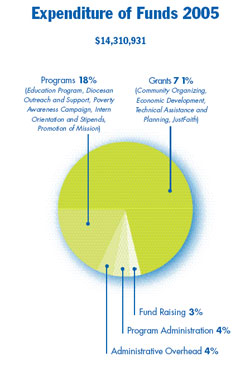Catholic Campaign for Human Development collection is Nov. 18-19

Graphic caption: The Catholic Campaign for Human Development supports programs that help poor and low-income people to help themselves.
By John Shaughnessy
The change and the hope have come gradually—including getting banks in the neighborhood to provide financial counseling and mortgage assistance to low-income families.
There is also a group in the same neighborhood that cleans up graffiti, and a Guardian Angels squad will soon take to the streets to help report crimes.
The developments are small but significant steps in trying to get residents of that poor neighborhood in the archdiocese to see the difference they can make individually and collectively—which is one of the main goals of the Catholic Campaign for Human Development.
As parishes across the archdiocese prepare to take a second collection on Nov. 18 and 19 to benefit the campaign, John Etling of Catholic Charities Terre Haute knows the difference the campaign has made to the Ryves Neighborhood Association in Terre Haute.
“We’re trying to empower people,” says Etling, the director of Catholic Charities Terre Haute. “They have a voice, and that voice needs to be organized so it has some power behind it. Our focus is, ‘Let’s do something.’ When we don’t participate, when we don’t get involved, we can never affect change.”
Changing lives has been the goal of the Catholic Campaign for Human Development since it was founded 36 years ago by the U.S. Conference of Catholic Bishops.
The campaign is “committed to supporting groups of low-income individuals as they work to break the cycle of poverty and improve their communities,” notes a fact sheet from the campaign. “By helping the poor to participate in the decisions and actions that affect their lives, CCHD empowers them to move beyond poverty.”
The 2005 collection in the archdiocese netted $128,000. Seventy-five percent of that money was shared with the national office of the campaign, which distributes grants throughout the country, according to David Siler, executive director of Catholic Charities in the archdiocese. He also notes that 25 percent of the funds stayed with the archdiocese to help local groups.
The 2005 campaign assisted four local efforts to help the poor create change in their neighborhoods.
Local campaign funds helped the Citizens Action Coalition to do community organizing of low-income Indiana residents who struggle to pay their utility bills, according to Siler.
The Church Federation of Greater Indianapolis received local funding for two programs. One is the federation’s Church and Neighborhood Partnership, which tries to create connections between Churches to help individuals see how they can deal with the causes of poverty. Another federation program is the Hispanic Latino Forum, which seeks to organize the efforts of local Churches to assist the area’s growing Hispanic population.
The Organization for a New Eastside in Indianapolis received a national grant to help residents in that area reduce crime, clean up abandoned homes and offer alternatives to gang activities, Siler notes.
“The campaign is a way for the whole Catholic community to participate,” Siler says. “The Catholic Church has a responsibility to keep our covenant with the poor. We build a lot of barriers among ourselves sometimes, but God says we’re one human family. We’re all responsible for relieving the suffering of all of our brothers and our sisters.” †
